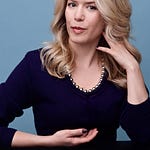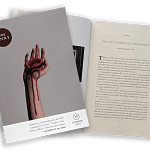This podcast was recorded about a week before its subject, Andrea Long Chu, was awarded the 2023 Pulitzer Prize for criticism, so it doesn't come up in the conversation with Blake Smith, but it's interesting to keep in mind as he and I analyze Chu and try to understand the particular role she plays in the broader intellectual and journalistic ecosystem.
Our story begins in early 2018, when the hipster intellectual magazine N+1 published a long essay titled “On Liking Women.” The essay, which went rather viral, was about the author’s transition to being a woman, her fascination with the 1967 radical tract the SCUM Manifesto, the dynamics of sissy porn, and her complicated feelings about wanting to be a woman, wanting women, and the universal fear of being feminized.
Its author, Andrea Long Chu, was at the time a doctoral student in comparative literature at NYU, and in all respects unfamous. The essay would change that, rather dramatically.
In the way that Ta-Nehisi Coates was, for a time, the black intellectual, and Wesley Yang was the Asian intellectual, Chu became, and perhaps remains, the trans intellectual of the moment. Later that year she wrote another splashy piece,“My New Vagina Won’t Make Me Happy,” for the New York Times. Her 2019 book, Females, got an immense amount of attention. In 2021 she was hired as a staff critic for New York magazine, and in that role has written a series of buzzed about reviews. She’s not famous, exactly, but she’s almost as close to it as journalists get it. She is now friends, for instance, with the genuinely famous Emily Ratajkowski, whom she profiled in The New York Times Magazine, and who later interviewed Chu for her own podcast, High Low with Emrata.
As she says to Ratajkowski, some of this success was a matter of timing. There was a space waiting to be filled. Trans issues had gotten big in the culture, and while there were a lot of good trans memoirs out there, and an increasing number of trans people making a name for themselves in the “influencer” space, there was neither an intellectual nor a magazine feature writer who had yet made a name for him or herself reliably and stylishly explaining the trans thing to the world.
Chu has been able to step into this space so successfully because she is a stylish writer, because she has a command of the relevant theory, and also because she has that thing that so many it boys and girls of journalism have had: she’s a tease. She comes close and dances away. She reveals and withholds, issues grand pronouncements, and then implies that she’s just kidding … maybe.
Here she is at the end of her breakout essay,
I am being tendentious, dear reader, because I am trying to tell you something that few of us dare to talk about, especially in public, especially when we are trying to feel political: not the fact, boringly obvious to those of us living it, that many trans women wish they were cis women, but the darker, more difficult fact that many trans women wish they were women, period. This is most emphatically not something trans women are supposed to want. The grammar of contemporary trans activism does not brook the subjunctive. Trans women are women, we are chided with silky condescension, as if we have all confused ourselves with Chimamanda Ngozi Adichie, as if we were all simply trapped in the wrong politics, as if the cure for dysphoria were wokeness. How can you want to be something you already are? Desire implies deficiency; want implies want. To admit that what makes women like me transsexual is not identity but desire is to admit just how much of transition takes place in the waiting rooms of wanting things, to admit that your breasts may never come in, your voice may never pass, your parents may never call back.
…This is not to garner pity for sad trannies like me. We have enough roses by our beds. It is rather to say, minimally, that trans women want things too. The deposits of our desire run as deep and fine as any. The richness of our want is staggering. Perhaps this is why coming out can feel like crushing, why a first dress can feel like a first kiss, why dysphoria can feel like heartbreak. The other name for disappointment, after all, is love.
I’ve been reading and listening to Chu recently, and I find myself atypically confused. I honestly don’t know what she’s trying to say, about gender and sexuality and sex and politics, nor whether she actually believes whatever it is she’s trying to say. I don’t know if she’s the real deal or, like so many it boys and girls of the past, she’s performing a role that is ultimately too disconnected from a genuinely grounded self to write things that are meaningful.
To help me process my confusion, I reached out to Blake Smith, who recently wrote a highly critical piece on Chu. Officially, Blake is an historian of modern France coming off a Fulbright in North Macedonia, and before that a PhD from Northwestern University. Unofficially, but more relevantly for our purposes, he’s been writing up a storm of intellectual but accessible essays over the past few years, for a variety of publications, most often Tablet, where the Chu piece was published. These fall into a few different buckets.
One is what I’d call his ongoing project to identify potential intellectual and creative resources for the revivification of liberalism. This has manifested in critical essays on various eminent and obscure European and American intellectuals, including folks like Michel Foucault, Philip Rieff, Judith Shklar, Leo Strauss, Jacob Taubes, Richard Howard, and Roland Barthes.
Another bucket is criticism of woke thinking and writing, and a third is his interest in queer theory. His Chu piece falls into both of the latter buckets, although Chu has a complicated relationship to woke. It may overlap with the first too, though that’s not as obvious a connection.
His Chu piece begins not with Chu herself, but with the archetypal conversion (or transition) story of western civilization, that of Saul of Tarsus, who had a vision of Jesus while on the road to Damascus. He abandoned his Judaism, changed his name to Paul, and dedicated his life to evangelizing for the new faith. Or, in Smith’s tart description, he just changed his stripes, remaining “what he had been before—an antagonizing, persecutory self-promoter,” but with a new lexicon of values and a new set of targets. Smith writes:
In his letters to churches throughout the Roman Empire, Paul gave an account of himself as being uniquely guilty and abject—the “chief of sinners”—and especially favored by God. In doing so, he created a powerful and enduring model for the way people seek attention and influence in Western culture, from the Confessions of Augustine to the ubiquitous self-narrations of our own moment. Flamboyant rejection of a former life, a lurid picture of its depravity and danger, the wrenching rapture of being overtaken and undone by an outward power, a new self to be declared and recognized by others, new enemies (shadows of the old self) to be exposed and attacked, and a continual staggering back and forth between declarations of one’s utter unworthiness and ethical exaltation.
One of the most successful contemporary practitioners of this mode of confession, in which a conversion is narrated in a mode of self-abasement and self-aggrandizement, is the essayist Andrea Long Chu. In 2018, Chu, who transitioned from male to female, established her reputation with essays for N+1 and The New York Times on her desire for femininity and her feelings about her new vagina. “Few of us” trans women, she argued, “dare to talk about” the truths she purportedly exposed in these essays—that transition is motivated by fetishistic investment in the most external, sexualized aspects of traditional femininity (“Daisy Dukes, bikini tops, and all the dresses, and, my god, for the breasts”)—and that transitioning had made her more dysphoric and “suicidal.”
Chu positioned herself in national publications as declaring hidden truths that other people like herself had been too cowardly to avow. Publications from The Point to The Nation to Vogue interviewed her, and New York magazine has more recently hired her, while scholars devote articles and even special issues of journals to her contributions to gender theory. The most notorious of the latter was her 2019 pamphlet-length book, Females, published with Verso, a press that once had something to do with the left. In Females, Chu worked on two different double registers. She played at once comic and serious, giving herself the right to backtrack her most radical claims as ironic “bits.” She gave, moreover, a reading of Valerie Solanas’ SCUM Manifesto (1967) as a statement about the nature of desire as such, for everyone, and as a kind of prefiguring of her own transition. It was as if Chu became the protagonist of Nabokov’s novel Pale Fire, who is convinced that a local writer’s autobiographical poem is in fact the elaborately allegorized story of his own life. Where Solanas had called for the extermination of men, she took her plan only as far as a failed attempt to murder Andy Warhol. Females ends with Solanas, at a distance of half-a-century, killing another “Andy”—Chu’s former, male self.
















Share this post